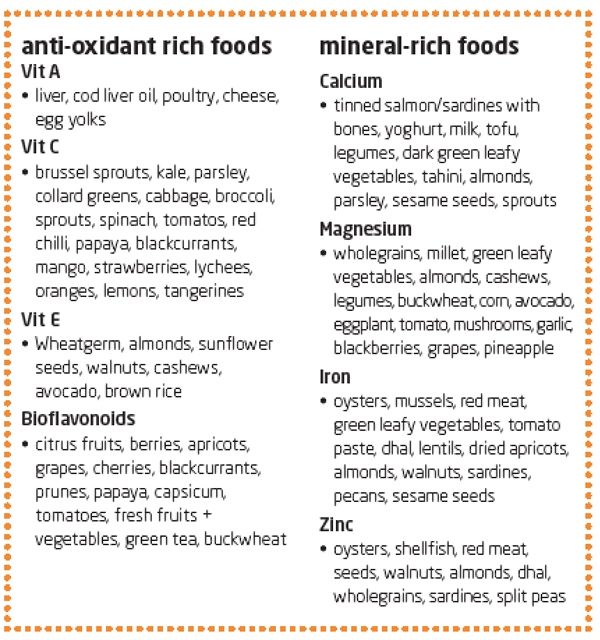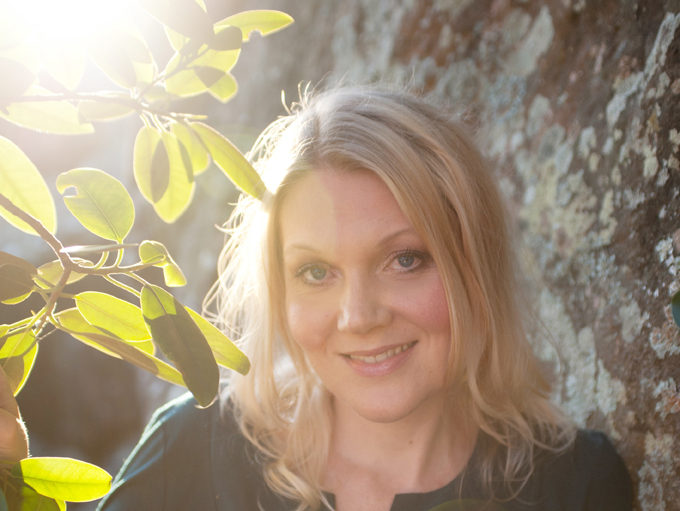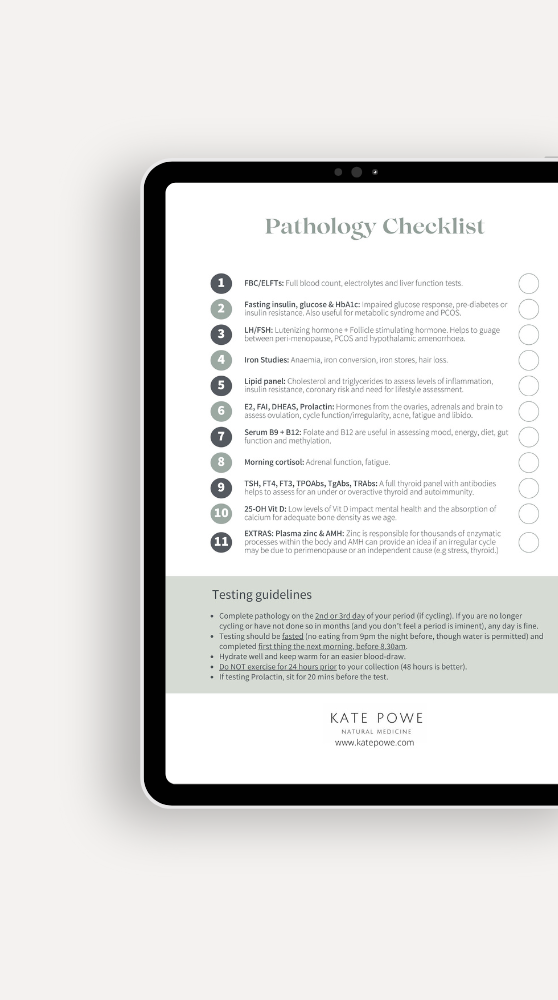Your hormonal cycle is a really good barometer of your body’s overall health.
It’s a super sensitive system and when it’s slightly off kilter, it’s often barraged with numerous medications and synthetic hormone replacements which in effect shuts down a core aspect of our feminine essence.
Rather than suppressing the symptoms, there is a lot we can do to naturally balance your hormones and help you to feel ‘normal’ again.
Whilst it can take a little time and dedication, one of the easiest ways to start is to look at what you’re feeding your body and how a simple readjustment of diet can help you see changes in pain, energy and mood every month.
- Calcium (and Manganese): increasing your calcium intake, especially 10 days before your period is due, can help support a smooth sailing cycle.
Calcium with Manganese has been found to assist mood and concentration whilst reducing menstrual pain, fluid retention and bloating.
Calcium-rich herb teas such as chamomile or nettle, sesame seeds, sardines (with bones) and lots of dark leafy greens ensures a dairy-free calcium boost to your daily diet.
- Magnesium: Magnesium is the number one stress buster.
It works alongside calcium and acts as a muscle relaxant, relieving period cramps, headache-causing stiff necks and shoulders and helps us have a restful sleep. It helps to regulate blood pressure and sugar levels and it also acts to balance cortisol (that stress hormone we all love to push to its limits).
Magnesium also has the ability to cross the blood brain barrier and has an impact on the hippocampus, an area of the brain where new memories are created and our future stress response is impacted.
Hence magnesium helps to calm and balance on multiple levels, from stress to pain to brain fog to weight balance.
Nuts, leafy greens and a cacao hit will all give you a beautiful magnesium boost.
- Iron: As women we bleed every month and some more than others.
During the process we can lose as little as 2 tablespoons or as much as 1/3 of a cup (and it can be a lot higher for some women with menorrhagia, or heavy bleeding) of iron-rich blood a month.
Yet iron is one of those minerals we tend to forget about when we’re dragging around feeling exhausted and can’t work out why.
Iron is an essential mineral for red blood cell production. Red blood cells, of course, carry oxygen to every cell in your body.
Without oxygen, we get pretty floppy right? Well so do your cells. So it’s a no brainer to think fatigue, think iron.
I encourage all my female clients to get their iron levels checked, in particular ferritin, which alerts us to the levels of stored iron as backup, and often we find these reserves need a boost.
As it’s toxic in high doses, it’s essential to test before self-prescribing an iron supplement. In the interim, upping your iron-rich foods including grass-fed beef, will ensure you give yourself a natural boost of this essential mineral.
- Zinc: One of my favourite minerals.
The king of immune health, it’s also the first thing to think of when you notice spotty skin, lackluster hair, cuts and grazes that aren’t healing quickly, stretch marks and white flecks under your fingernails.
From a hormone perspective, zinc is required for healthy egg production in women, and healthy sperm production in men and helps a healthy oestrogen:progesterone balance.
It’s a cofactor for a number of important methylation processes including DNA synthesis and is a key mineral implicated in mood disorders including anxiety and depression.
So if you’re noticing acne, mood swings, signs of oestrogen imbalance (including heavy, irregular or painful periods) or are feeling run down around your period, up those zinc foods like grass-fed red meats, shellfish/sardines, eggs (yolk), mushrooms and nuts/seeds to get you back to beaming.
Dietary Hormone Helpers
Kate is a qualified naturopath who is passionate about helping women heal from hormonal havoc and inspiring women to know their own power, worth and wisdom.
Kate offers one-on-one Skype consults for irregular cycles, PMS and period pain, endometriosis, PCOS, peri-menopause, mood swings, fatigue and mental and emotional stress.
Simply drop me an email to see how I can help you!










2 thoughts on “Four Key Minerals for Hormonal Health”
Dear Kate,
I would love some input/advice on my scenario.
I am a 34 year old with a long term partner (10 years) now my fiance.
I have been on the pill on and off since as early as 13 (originally for acne) but for the last 8 years have been on it non-stop.
I am on a brand which contains ethinylestradiol and gestodene.
As of many years ago my then gynae told me it is absolutely fine to skip my placebos every month as I was getting heavy and painful withdrawal bleeds. I did that for years, with the exception of a break from that routine every 3-6 months by taking the placebos.
Recently I have lost my withdrawal bleed, and at most I get one day of spotting (brown blood).
I have since changed Doctors and now have a very supportive female doctor. Since I definitely want to have kids in the next 2 – 3 years, I have decided to come off the pill to give my body time to get back to ‘normal.
I have no idea what my real period will be like, and if I will see a return of my teen acne, I am hoping that my hormones have changed significantly since then 🙂
I have done quite a bit of prep for the transition to make it as smooth as possible and would really appreciate your feedback on it.
I have started Magnesium Glycinate, 200mg at night, I take Zinc Picolinate (150mg) with a vit-b complex and I also take 1000mg vit c per day (have been for years).
Only other medication I am on is Fluoxetine (in hindsight my mental health wobble might have been related to the pill all along) but I plan on coming off it by the end of the year.
I also have started with seed cycling but that is really difficult on the pill so I think I will wait until my real period appears.
I had an internal scan done a week ago which shows normal ovaries with a normal amount of follicles, as well as a healthy uterus with a VERY thin lining. My blood tests revealed a bit of a magnesium deficiency (i know the blood test is not accurate), I have a partial Vitamin D Deficiency and my Vitamin B12 is borderline.
My questions are:
Can i add a high potency vitamin D supplement (5000IU) to what I am already taking, and also are the following amounts of Vitamin B’s safe for daily intake:
Vit B1 – 120mg
Vit B6 – 225mg
Vit B12 – 225 ug
I have started a chart as I plan to use the FAM method as well as condoms for contraception, and I will be using the Kindara app.
Slightly nervous about the change and terrified about PBCS, but mostly worried about the effect, if any, it might have on my mental health.
I will appreciate any advice, feedback or comments very much.
Kind Regards,
Yvandi
Hi Bambi,
I’m sorry but I can’t comment specifically on your case without a consult. If you’d like me to review your case/pathology/results you can book an online consult on the website or email me at info@katepowe.com to book an appointment.
Comments are closed.